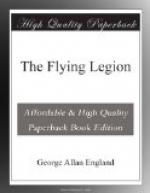For a time the Master sat in the thickening gloom, eating the dates and temmin wafers, drinking the coffee, pondering in deep silence. When the simple meal was ended, he plucked a little sprig of leaves from the khat plant in the bowl, and thrust them into his mouth.
This khat, gathered in the mountains back of Hodeida, on the Red Sea not far from Bab el Mandeb, had been preserved by a process known to only a few Coast Arabs. The plant now in the bowl was part of a shipment that had been more than three months on the way; yet still the fresh aroma of it, as the Master crushed the thick-set, dark-green leaves, scented the darkening room with perfumes of Araby.
Slowly, with the contemplative appreciation of the connoisseur, the Master absorbed the flavor and the wondrous stimulation of the “flower of paradise.” The use of khat, his once-a-day joy and comfort, he had learned more than fifteen years before, on one of his exploring tours in Yemen. He could hardly remember just when and where he had first come to know the extraordinary mental and physical stimulus of this strange plant, dear to all Arabs, any more than he definitely recalled having learned the complex, poetical language of that Oriental land of mystery. Both language and the use of khat had come to him from contact with only the fringes of the country; and both had contributed to his vast, unsatisfied longing to know what lay beyond the forbidden zones that walled this land away from all the world.
Wherever he had gone, whatever perils, hardships, and adventures had been his in many years of wandering up and down the world, khat, the wondrous, had always gone with him. The fortune he had spent on keeping up the supply had many times over been repaid to him in strength and comfort.
The use of this plant, containing obscure alkaloids of the katinacetate class, constituted his only vice—if you can call a habit such as this vice, that works great well-being and that leaves no appreciable aftermaths of evil such as are produced by alcohol or drugs.
For a few minutes the Master sat quite motionless, pondering. Then suddenly he got up again, and strode to one of the westward-looking windows. The light was almost wholly gone, now. The man’s figure, big-shouldered, compact, well-knit, appeared only as a dim silhouette against the faded blur in the west; a blur smoky and streaked with dull smudges as of old, dried blood.
Far below, stretching away, away, shimmered the city’s million inconsequential lights. Above, stars were peeping out—were spying down at all this feverish mystery of human life. Some of the low-hung stars seemed to blend with the far lights along the Palisades. The Master’s lips tightened with impatience, with longing.
“There’s where it is,” he muttered. “Not five miles from here! It’s there, and I’ve got to have it. There—a thing that can’t be bought! There—a thing that must be mine!”




